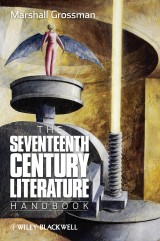Details

The Seventeenth - Century Literature Handbook
Wiley Blackwell Literature Handbooks 1. Aufl.
|
31,99 € |
|
| Verlag: | Wiley-Blackwell |
| Format: | |
| Veröffentl.: | 18.11.2010 |
| ISBN/EAN: | 9781444390100 |
| Sprache: | englisch |
| Anzahl Seiten: | 432 |
DRM-geschütztes eBook, Sie benötigen z.B. Adobe Digital Editions und eine Adobe ID zum Lesen.
Beschreibungen
THE <B>SEVENTEENTH CENTURY LITERATURE </B>HANDBOOK <p>“Never a dull read, Marshall Grossman’s elegant volume bristles with sharp ideas to inform, stimulate and challenge his audience.” <p><i><b>Thomas Corns, Bangor University</b></i> <p>The seventeenth century was a dramatic period in British history, witnessing two revolutions, huge constitutional change, the widening of the political and literary classes, and the gradual acceptance of women as authors. This easy-to-use Handbook offers readers a succinct overview of this complex period, guiding them through the principal literary works, figures and innovations of the time. Focusing on studying texts in context, Marshall Grossman explores the ways in which major works, including <i>Hamlet, Paradise Lost and The Pilgrim’s Progress,</i> both reflected and helped to shape the history of the time, while concise sections on topics such as the Gunpowder Plot and the Pamphlet Wars allow the reader to engage more fully with the central themes and preoccupations of the period. Concluding with a series of brief biographical profiles describing the life and works of the century’s most significant and influential writers, <i>The Seventeenth-Century Literature Handbook</i> is essential reading for anyone interested in British Literature across the civil war and restoration periods.
<p>Preface xi</p> <p>Chronology xv</p> <p><b>Part 1 Texts and Contexts: An Overview 1</b></p> <p>Reading the Historical Landscape 3</p> <p>Renaissance and/or Reformation: From Elizabeth to James 5</p> <p>New Science Leaves All in Doubt 14</p> <p>Business and Trade 34</p> <p>Breaking the State 59</p> <p>The Restoration 86</p> <p>The Short Reign of James II and the Glorious Revolution of 1688 97</p> <p>The Production of Culture in the Seventeenth Century 104</p> <p><b>Part 2 Topics in Seventeenth-Century Literature 125</b></p> <p>Aemilia Lanyer and the Gendering of Genre 127</p> <p>Changing Conventions: <i>Hamlet</i> and <i>The Alchemist</i> 141</p> <p>Pamphlet Wars: To Kill a King! 149</p> <p>Everything Happens Twice 166</p> <p><b>Part 3 Some Key Texts 189</b></p> <p>The Winter’s Tale 191</p> <p>Areopagitica 203</p> <p>Paradise Lost 212</p> <p>The Pilgrim’s Progress 220</p> <p><b>Part 4 Writers of the Seventeenth Century 225</b></p> <p>Astell, Mary (1666–1731) 227</p> <p>Bacon, Francis (1561–1626) 229</p> <p>Baxter, Richard (1615–1691) 236</p> <p>Beaumont, Francis (1584–1616) 240</p> <p>Behn, Aphra (1640?–1689) 243</p> <p>Boyle, Robert (1627–1691) 247</p> <p>Browne, Sir Thomas (1605–1682) 250</p> <p>Bunyan, John (1628–1688) 253</p> <p>Burton, Robert (1577–1640) 257</p> <p>Carew, Thomas (1594/5–1640) 259</p> <p>Cavendish, Margaret, Duchess of Newcastle (1623–1673) 261</p> <p>Cowley, Abraham (1618–1667) 263</p> <p>Crashaw, Richard (1613–1648) 265</p> <p>Davenant, Sir William (1606–1668) 267</p> <p>Donne, John (1572–1631) 270</p> <p>Dryden, John (1631–1700) 278</p> <p>Filmer, Sir Robert (1588–1653) 283</p> <p>Fletcher, John (1579–1625) 285</p> <p>Fox, George (1624–1691) 287</p> <p>Hartlib, Samuel (1600–1662) 290</p> <p>Herbert, George (1593–1633) 293</p> <p>Herrick, Robert (1591–1674) 297</p> <p>Hobbes, Thomas (1588–1679) 299</p> <p>Hutchinson, Lucy (1620–1681) 303</p> <p>Hyde, Edward, First Earl of Clarendon (1609–1674) 306</p> <p>Jonson, Ben (1572–1637) 309</p> <p>Lanyer, Aemilia (1569–1645) 314</p> <p>Locke, John (1632–1704) 316</p> <p>Lovelace, Richard (1617–1657) 322</p> <p>Marvell, Andrew (1621–1678) 325</p> <p>Middleton, Thomas (1580–1627) 330</p> <p>Milton, John (1608–1674) 333</p> <p>Otway, Thomas (1652–1685) 342</p> <p>Pepys, Samuel (1633–1703) 345</p> <p>Philips, Katherine (1632–1664) 347</p> <p>Shadwell, Thomas (1640–1692) 350</p> <p>Shakespeare, William (1564–1616) 353</p> <p>Suckling, Sir John (1609–1641) 358</p> <p>Traherne, Thomas (1637–1674) 360</p> <p>Vaughan, Henry (1621–1695) 364</p> <p>Webster, John (1578?–1638?) 367</p> <p>Wilmot, John, Earl of Rochester (1647–1680) 370</p> <p>Wroth, Lady Mary (1587–1653?) 373</p> <p>Works Cited 375</p> <p>Index 387</p>
<p>“This project captures the generosity and elegance of Marshall Grossman’s teaching and scholarship and reminds us of why he will continue to be so much missed.” (<i>Milton Quarterly</i>, 16 October 2014)<br /> <br /> "Written with a beginner audience in mind. Grossman provides an overview of seventeenth-century historical, literary, and cultural shifts, along with short essays on notable early seventeenth-century texts. <i>The Seventeenth-Century Literature Handbook</i> will be of particular interest to teachers of seventeenth-century literature courses, as the text would be appropriate to assign at the undergraduate level." (<i>The Year's Work in English Studies</i>, 2013)</p>
<p><b>Marshall Grossman</b> is Professor of English at the University of Maryland, College Park, USA. He is the author of <i>The Story of All Things: Writing the Self in English Renaissance Narrative Poetry</i> (1998) and <i>‘Authors to Themselves’: Milton and the Revelation of History</i> (1987); he is editor of two collections of essays, <i>Reading Renaissance Ethic</i>s (2007) and <i>Aemilia Lanyer: Gender, Genre, and the Canon </i>(1998). He is currently completing a book on Milton and rational religion.</p>
<p>“Never a dull read, Marshall Grossman’s elegant volume bristles with sharp ideas to inform, stimulate and challenge his audience.”</p> <p><i><b>Thomas Corns, Bangor University</b></i> <p>The seventeenth century was a dramatic period in British history, witnessing two revolutions, huge constitutional change, the widening of the political and literary classes, and the gradual acceptance of women as authors. This easy-to-use Handbook offers readers a succinct overview of this complex period, guiding them through the principal literary works, figures and innovations of the time. Focusing on studying texts in context, Marshall Grossman explores the ways in which major works, including <i>Hamlet, Paradise Lost and The Pilgrim’s Progress,</i> both reflected and helped to shape the history of the time, while concise sections on topics such as the Gunpowder Plot and the Pamphlet Wars allow the reader to engage more fully with the central themes and preoccupations of the period. Concluding with a series of brief biographical profiles describing the life and works of the century’s most significant and influential writers, <i>The Seventeenth-Century Literature Handbook</i> is essential reading for anyone interested in British Literature across the civil war and restoration periods.
"Never a dull read, Marshall Grossman's elegant volume bristles with sharp ideas to inform, stimulate and challenge his audience."<br /> <b>—Thomas Corns</b>, Bangor University


















